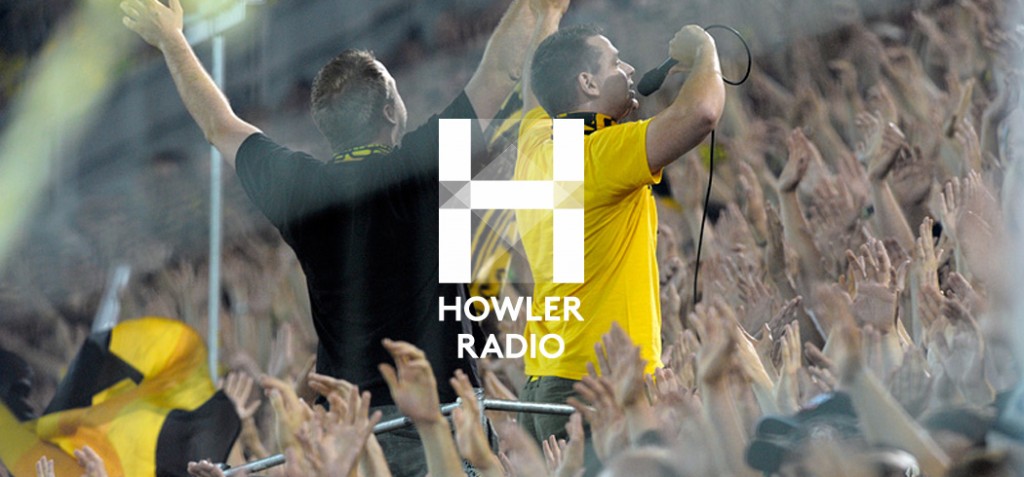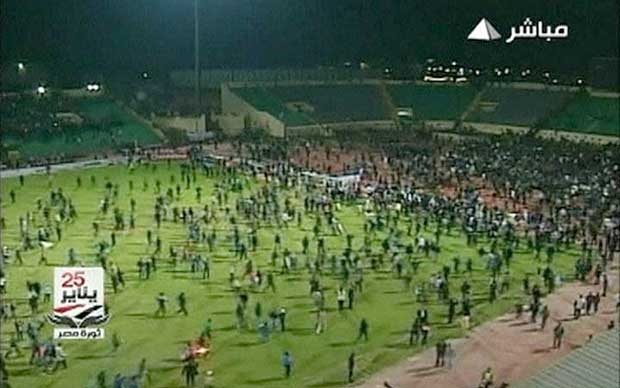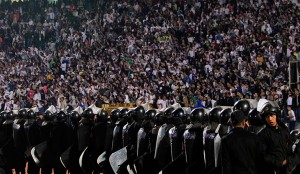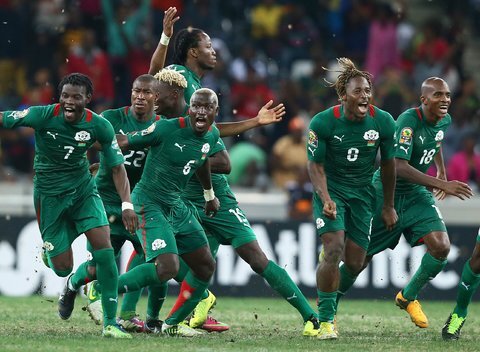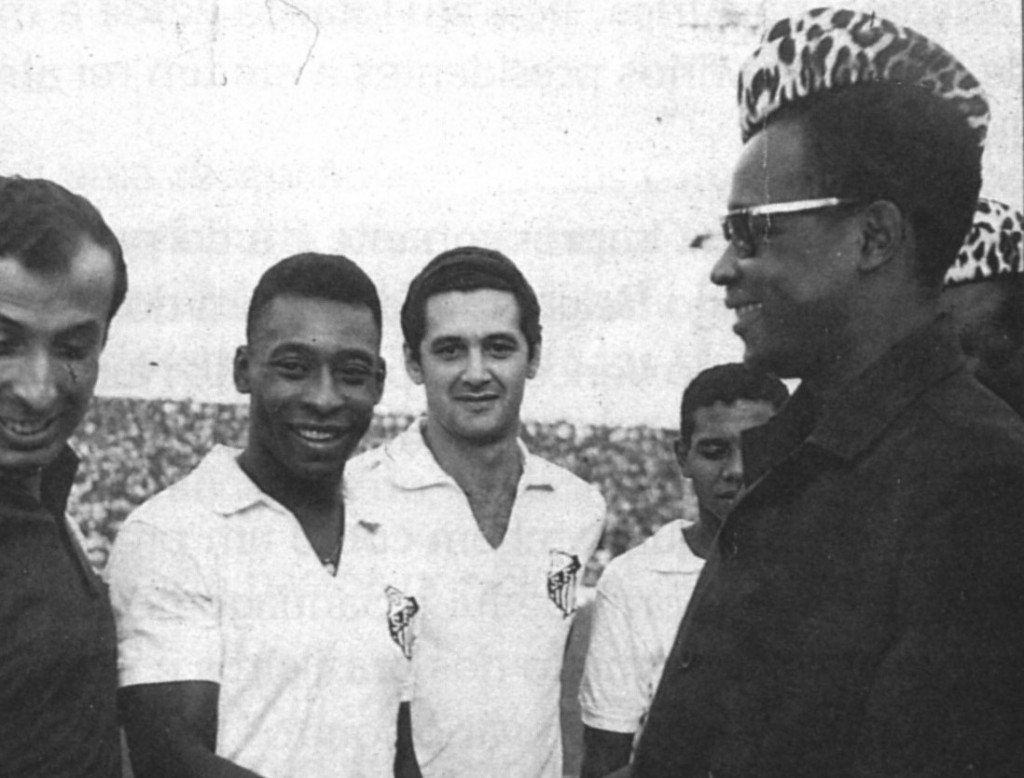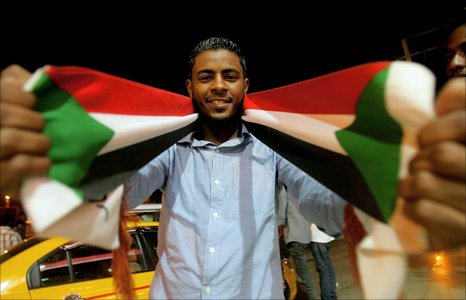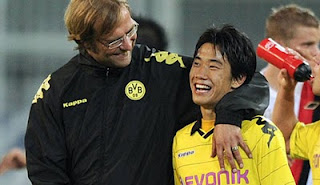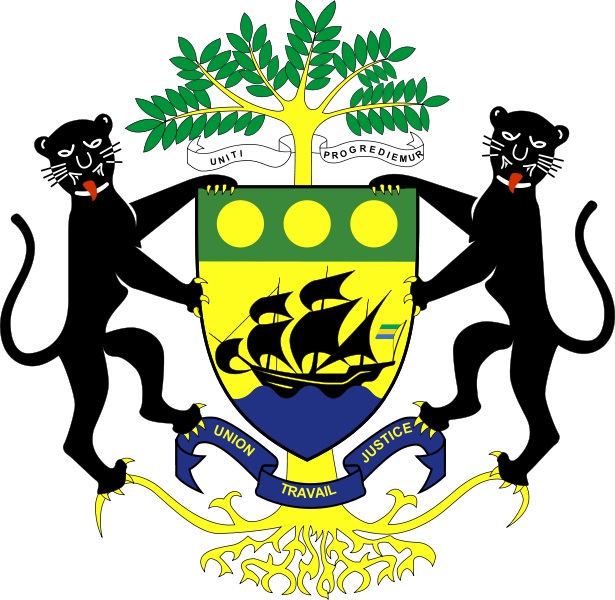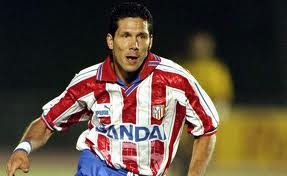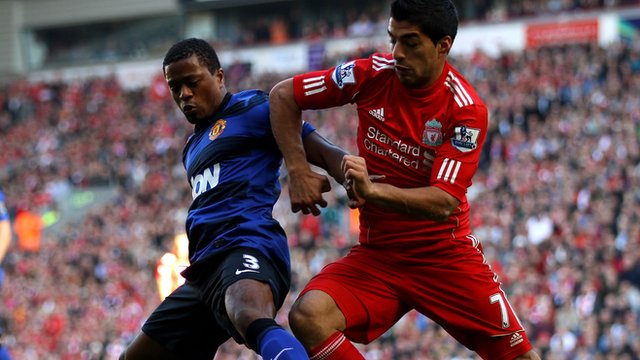[Editor’s note: This was the inaugural installment in what’s become an ongoing Dictators and Soccer series. See also subsequent articles on Nicolae Ceaușescu of Romania, Kim Jong-il and North Korea (or Football, Famine and Giant Rabbits), and Pope Benedict XVI and Vatican City. Stay tuned for Col. Gaddafi]
In 1974 the ex-colonial and newly named Zaïre played its first World Cup in West Germany. The country’s diminutive strongman Mobutu Sésé Seko, famous for his trademark leopard-print pillbox hat, had rechristened the Lions the Leopards. (Consistency is key in propaganda.) He had convinced himself that Zaïrean soccer could further elevate his own stature. He liked elevating himself and he liked renaming things. He’d re-minted the country from Congo Crisis First Republic (formerly The Belgian Congo) to Zaïre, which translated to, “The river that swallows other rivers.” He fully intended to hoover up every power and exploit every possibility. He’d already outlawed all political parties except his own, and outlawed all wearing of leopard-print hats, except of course his own.
A huge fan of the cult of personality concept, he’d previously changed his own name from Joseph-Désiré Mobutu to Mobutu Sésé Seko Nkuku Ngbendu Wa Za Banga, or “The All-Conquering Warrior, Who Goes from Triumph to Triumph.” Clearly, Mobutu would accept nothing less than glorious triumph. Some translate the phrase as, “The Cock That Leaves No Hen Unruffled,” in reference to his boasted sexual prowess. (It’s odd how one long phrase could mean both, but Mobutu was an inscrutable master in the arts of naming and renaming.) He also went by the names “The Big Man,” “The Leopard” and, most humbly, “The Messiah.” Mobutu and his female companions took frequent shopping trips to Paris and Brussels by Concorde. (These female companions included his first wife Marie-Antoinette, his second wife Bobi and his mistress, somewhat creepily Bobi’s identical twin sister.)
Known more for plundering the treasury, pocketing $46 billion in foreign aid and trampling the rights of his people than bestowing gifts upon the people, he surprised everyone by inviting the soccer players to his presidential palace and giving each a house and car, upon qualifying for the tournament. Fake it to make it. Spend money to make money. He had similarly exhibited a shrewd marketing mind in teaming with Don King and fronting the $10 million outlay for Muhammad Ali’s Rumble in the Jungle with George Foreman in 1974.
Of Mobutu and Zaïre, Ali famously said, “Some countries go to war to get their names out there, and wars cost a lot more than $10 million.” When Muhammad Ali praises your image technique, you know you’re on the right track.
As part of said propaganda campaign, law dictated every public building must hang Mobutu’s picture somewhere. The evening news showed a spectral image of him arriving to Earth on a sort of magic carpet of pillowy clouds. Only his name could be spoken, and the TV really just largely reported supernatural feats of Mobutu’s, such as killing a lion with bare hands at age 7, or how bullets and spears would deflect off his bare chest as if he were made of adamantium.
But back to soccer in contact with Mobutu’s relentless ambition. With the boxing match set for October 1974, and with summer generally preceding fall, Mobutu first demanded greatness in the 1974 World Cup. Zaïre had just won the 1974 African Cup of Nations, they were sub-Saharan Africa’s celebrity squad and greatness seemed within their grasp. Only it didn’t quite work out that way for the first all-black African team in the tournament.
In the first group stage match, Zaïre lost to Scotland 2-0. No catastrophe there. The 9-0 mauling from Yugoslavia the next match smarted somewhat more. The night before its third match versus reigning champions Brazil, Mobutu sent presidential guards to threaten the players, saying if they lost 4-0, there would be hell to pay. Forget 4-0, a double-digit scoreline seemed more likely—even without Pelé, Brazil was still Brazil, and the team packed legends such as Rivelino, Jairzinho and Edu. Fortunately, Zaïre escaped with merely a 3-0 hiding. Bizarrely, as Rivelino lined up to take a Brazil free kick 30 yards from the Zaïre goal with five minutes to go, one of the Zaïreans burst from the defensive wall and hoofed it downfield. He got a yellow card. He probably preferred West German jail time with some remote possibility of defection.
Zero goals scored, 14 conceded. One of the weirdest free kick moments ever. The players understandably did not relish their homecoming. Mobutu may have looked playfully cartoonish in his leopard print, but in his daily dictatorship duties, coldblooded cruelty defined his persona much more accurately.
Six years previous, in 1968, when the Leopards had won the African Cup of Nations, the homecoming was vintage bizarre Mobutu. Garlanded with flowers, players disembarked the plane wearing large white boards hung around their necks, their names printed on the unwieldy semi-sandwich boards. Afterwards, Mobutu had invited Pelé and Brazilian club team Santos for exhibition matches in Zaïre and elsewhere, introduced the the teams in lavish PR grandstands and it was officially football fever.
Such was not the case in post-defeat 1974. The stadia at the World Cup may have featured slogans on expensive advertising boards proclaiming “Zaïre – Peace” and “Go to Zaïre,” but returning players would be excused for not dying to go back to Zaïre and the alleged peace that awaited. One thing that did not await at the airport in Kinshasa, the capital, however, was any sort of welcome committee or transportation. Players had to cadge rides from sympathetic cab drivers, as they had no money. Officials from the Zaïre football federation had apparently appropriated players’ wages for themselves.
“We got back home without a penny in our pockets.” Leopards star Ilunga Mwepu (the guy who beat Brazil to the free kick, from the wrong direction) told the BBC in 2002, “but we had the erroneous belief that we would returning from the World Cup as millionaires.” He claimed he intentionally took the kick to get sent off in protest against Mobutu, the strongarm tactics and the (correct) suspicion that the players would not get paid. Others say he didn’t know the rules, which seems pretty ridiculous since he was a professional soccer player.
The rumor mill says that Mobutu dressed down the players in no uncertain terms the following day, and everyone not wearing a leopard-skin hat slunk off with a sort of bad omen clinging to them that more than a few would have interpreted as of premonition of death. The country’s best players like Mwepu were forbidden to seek out pastures new in other countries, toiling away in the country’s barely remunerative home league. This included all the recently repatriated Belgian Congo-born players playing in Belgium that Mobutu hoodwinked into returning home. The country withdrew from 1978 World Cup qualification and Mobutu washed his hands of the miserable affair.
It’s not a happy story. So we’ll end with a little random factoid. Mobutu played goalkeeper for his Catholic high school in the ’30s until he got kicked out for chasing the drinks and ladies of Leopoldville, the town that in his later renaming frenzy he would one day call Kinshasa, where it’s sometimes hard to get a ride home from the airport. By Belgian Congo law, getting kicked out meant he had to join the army, which is ultimately how he seized power.
The Democratic Republic of Congo (*breath*…the country’s current name) will play in the 2013 Africa Cup of Nations. Hopefully post-Mobutu, who was overthrown in 1997, the DR Congo has a shot to return triumphs again to the beleaguered nation. (In the knockout qualification round, they beat Equatorial Guinea, one of last year’s co-hosts and the subject of an upcoming Dictators and Soccer installment. Two Equatorial Guinea dictators, uncle and nephew, occasionally included soccer in their nefarious plots, not least in suppressing freedom of the foreign press in the 2012 Africa Cup of Nations, or when the uncle assembled 150 political opponents in a soccer stadium and had them all shot. To read about Nicolae Ceaușescu, match fixer, see here.)
A 2010 documentary Between the Cup and the Election chronicles a reunion of the ’74 Leopards, with a walk down memory lane in “The Leopard Neighborhood,” where Mobutu had gifted some the houses they later had to sell to survive. Good times, golden memories.
Dictators and Soccer/Football:
Mobutu Sésé Seko (Zaïre)
Nicolae Ceaușescu (Romania)
Kim Jong-il (North Korea)
Pope Benedict XVI (Vatican City)
https://twitter.com/tyrannosoccer
https://www.facebook.com/DictatorsAndSoccer
Copyright © 2012

